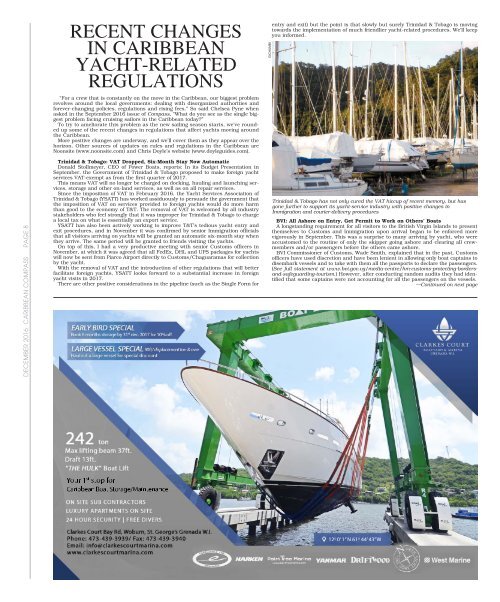Caribbean Compass Yachting Magazine December 2016
Welcome to Caribbean Compass, the most widely-read boating publication in the Caribbean! THE MOST NEWS YOU CAN USE - feature articles on cruising destinations, regattas, environment, events...
Welcome to Caribbean Compass, the most widely-read boating publication in the Caribbean! THE MOST NEWS YOU CAN USE - feature articles on cruising destinations, regattas, environment, events...
Create successful ePaper yourself
Turn your PDF publications into a flip-book with our unique Google optimized e-Paper software.
RECENT CHANGES<br />
IN CARIBBEAN<br />
YACHT-RELATED<br />
REGULATIONS<br />
“For a crew that is constantly on the move in the <strong>Caribbean</strong>, our biggest problem<br />
revolves around the local governments: dealing with disorganized authorities and<br />
forever-changing policies, regulations and rising fees.” So said Chelsea Pyne when<br />
asked in the September <strong>2016</strong> issue of <strong>Compass</strong>, “What do you see as the single biggest<br />
problem facing cruising sailors in the <strong>Caribbean</strong> today?”<br />
To try to ameliorate this problem as the new sailing season starts, we’ve rounded<br />
up some of the recent changes in regulations that affect yachts moving around<br />
the <strong>Caribbean</strong>.<br />
More positive changes are underway, and we’ll cover them as they appear over the<br />
horizon. Other sources of updates on rules and regulations in the <strong>Caribbean</strong> are<br />
Noonsite (www.noonsite.com) and Chris Doyle’s website (www.doyleguides.com).<br />
GICHUMBI<br />
entry and exit) but the point is that slowly but surely Trinidad & Tobago is moving<br />
towards the implementation of much friendlier yacht-related procedures. We’ll keep<br />
you informed.<br />
DECEMBER <strong>2016</strong> CARIBBEAN COMPASS PAGE 8<br />
Trinidad & Tobago: VAT Dropped, Six-Month Stay Now Automatic<br />
Donald Stollmeyer, CEO of Power Boats, reports: In its Budget Presentation in<br />
September, the Government of Trinidad & Tobago proposed to make foreign yacht<br />
services VAT-exempt as from the first quarter of 2017.<br />
This means VAT will no longer be charged on docking, hauling and launching services,<br />
storage and other on-land services, as well as on all repair services.<br />
Since the imposition of VAT in February <strong>2016</strong>, the Yacht Services Association of<br />
Trinidad & Tobago (YSATT) has worked assiduously to persuade the government that<br />
the imposition of VAT on services provided to foreign yachts would do more harm<br />
than good to the economy of T&T. The removal of VAT is welcomed by all industry<br />
stakeholders who feel strongly that it was improper for Trinidad & Tobago to charge<br />
a local tax on what is essentially an export service.<br />
YSATT has also been actively working to improve T&T’s tedious yacht entry and<br />
exit procedures, and in November it was confirmed by senior Immigration officials<br />
that all visitors arriving on yachts will be granted an automatic six-month stay when<br />
they arrive. The same period will be granted to friends visiting the yachts.<br />
On top of this, I had a very productive meeting with senior Customs officers in<br />
November, at which it was agreed that all FedEx, DHL and UPS packages for yachts<br />
will now be sent from Piarco Airport directly to Customs/Chaguaramas for collection<br />
by the yacht.<br />
With the removal of VAT and the introduction of other regulations that will better<br />
facilitate foreign yachts, YSATT looks forward to a substantial increase in foreign<br />
yacht visits in 2017.<br />
There are other positive considerations in the pipeline (such as the Single Form for<br />
Trinidad & Tobago has not only cured the VAT hiccup of recent memory, but has<br />
gone further to support its yacht-service industry with positive changes in<br />
Immigration and courier-delivery procedures<br />
BVI: All Ashore on Entry, Get Permit to Work on Others’ Boats<br />
A longstanding requirement for all visitors to the British Virgin Islands to present<br />
themselves to Customs and Immigration upon arrival began to be enforced more<br />
vigorously in September. This was a surprise to many arriving by yacht, who were<br />
accustomed to the routine of only the skipper going ashore and clearing all crewmembers<br />
and/or passengers before the others came ashore.<br />
BVI Commissioner of Customs, Wade Smith, explained that in the past, Customs<br />
officers have used discretion and have been lenient in allowing only boat captains to<br />
disembark vessels and to take with them all the passports to declare the passengers.<br />
(See full statement at www.bvi.gov.vg/media-centre/hm-customs-protecting-bordersand-safeguarding-tourism.)<br />
However, after conducting random audits they had identified<br />
that some captains were not accounting for all the passengers on the vessels.<br />
—Continued on next page


















